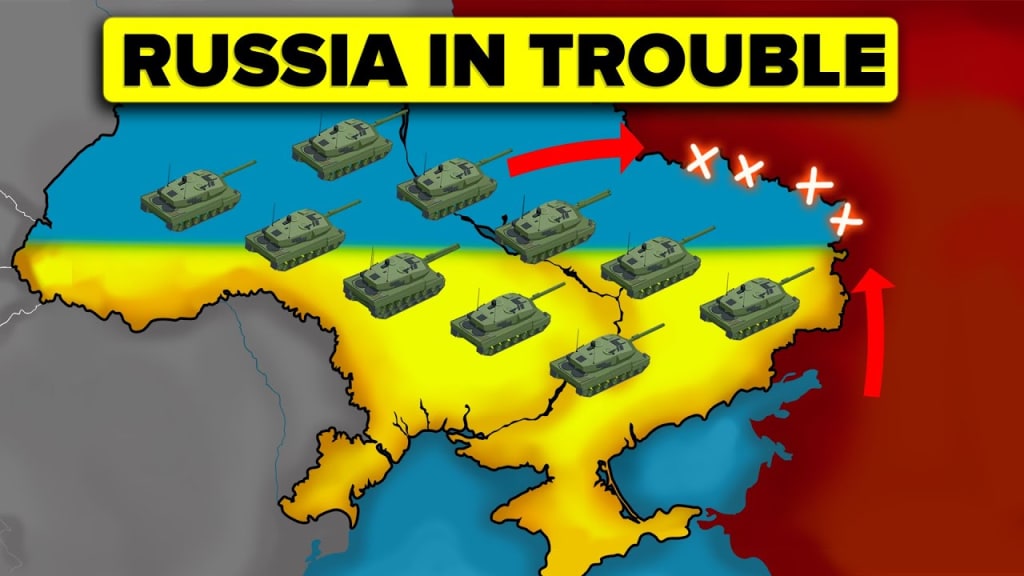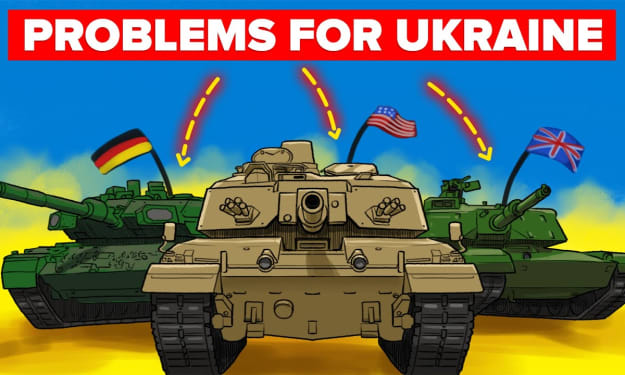New Statistics Explain Why Russia Would Lose in the Ukraine Conflict
A big deployment is imminent, and Russia has just increased its bombing raids in Ukraine. Putin appears to be optimistic about his chances of winning the battle this year. Yet, the truth may be quite different. Check out this revelatory narrative to see why Putin is set for a harsh awakening as he frantically fights to retain his power delusion. 🏴☠️⚓⚓🏴☠️

A big deployment is imminent, and Russia has just increased its bombing raids in Ukraine. Putin appears to be optimistic about his chances of winning the battle this year. Yet, the truth may be quite different. Check out this revelatory narrative to see why Putin is set for a harsh awakening as he frantically fights to retain his power delusion. 🏴☠️⚓⚓🏴☠️
A significant mobilization is imminent, and in recent weeks, Russia has intensified its bombing campaign against Ukraine. Putin appears confident that he will win the war this year. But the truth might be entirely different because the odds do not appear to be in Putin's favor according to western intelligence on the Russian army. Any military confrontation initially appears to favor Russia. They have three million active and reserve members, which is more than Ukraine has. Russia spends an average of 65 billion dollars annually on its military, compared to Ukraine's annual military budget of about ten billion dollars. Of course, Russia also possesses nuclear weapons, whereas Ukraine gave up its stockpile in the years following the collapse of the Soviet Union. It appears to be a traditional David vs. The fact that Ukraine has continued the fight for this long is impressive because it is reminiscent of the David and Goliath story.
However, looks can be deceiving. At the outset of the war, Russia made some critical errors. Although it is technically a non-aligned country, Ukraine is encroaching more and more on the European Union and NATO. When Russia first invaded, it made many audacious claims about engulfing its neighbor, including threats against NATO for being on its border. That effectively put an end to any discussion about whether this was a domestic Russian problem, as Putin claimed, and it mobilized a large portion of the rest of the world to support Ukraine. This indicates that Russia is no longer merely opposing Ukraine. Although technically there aren't any foreign armies assisting Ukraine—and for good reason—Putin has made it clear he would regard such assistance as an act of war and retaliate against NATO.
However, the West has provided Ukraine with a significant amount of equipment and training. Despite some complaints about the cost, the flow of supplies is still going. The majority of the equipment came from NATO member countries, with the United States accounting for the lion's share. This is not surprising given that the US provided over $150 billion in total foreign aid, including military and humanitarian assistance, in just the first year of the conflict, and the majority of that money is being used effectively. Direct military aid, worth 48 billion dollars, has made up about a third of this aid. This includes both the shipment of weapons and the money used to purchase weapons systems from outside sources. The United States provides a vastly disproportionate amount of this military funding—more than half.
Putin has little influence over the United States, so even though this seems surprising, there is a good reason for it. Despite the fact that Putin's threats to attack European countries are as unlikely as him winning the war, he does have one significant card to play: energy supplies. Some governments have been reluctant to support Ukraine because they are concerned about going without heat during the winter. Winter is already here, and much of Europe is supplied by Russian gas and oil. Such worries don't exist in the United States, though. The United States always finds itself far from the front lines of any geopolitical conflict, which is a significant advantage for the country. There are just two allies without militaries that could pose a threat to it along its border.
Since the Soviet Union's attempt to station nuclear missiles in Cuba was thwarted, none of its neighbors in the Caribbean or South America are viewed as threats as well. In terms of energy, it is also largely self-sufficient, producing the majority of its own oil or importing it from allies like Saudi Arabia and Canada. The only way to attack the US is through a much more overt military operation; Putin should inquire as to how that went for Japan. The same is true of Ukraine's second-largest supplier. Over the past year, Ukraine has received close to $4 billion in military aid from the UK, including some of its most cutting-edge anti-aircraft missiles. Due to its island status, the United Kingdom is less reliant on Russia for its energy needs than countries in mainland Europe.
It shows the fine line they're treading that the European Union, which Britain left a few years ago, has given out over $3 billion in total military aid. The same is true for nations like Germany, Poland, and the Czech Republic, which all remember what it was like to live under Soviet rule. The most crucial thing is that Kyiv can easily restock its military as required. But what has that actually bought? To put it simply, a lot. The nation has been largely in a constant state of war for a year and has had to use the majority of its military reserves to fend off Russia. Ammunition, weapons, body armor, and field supplies—all essential for maintaining an army in combat readiness—were all provided as part of the military assistance to Ukraine.
But that is only the beginning. Before the war broke out, the Ukrainian army had only modest capabilities, but now that it has access to some of the most cutting-edge military hardware available, it is prepared to confront Putin. And one specific piece of equipment has completely changed the game. The HIMARS is a truck-mounted system with a top-notch radar system that allows it to shoot at virtually anything the Russians have to offer. It may be the most sophisticated multiple rocket launchers in US history. Either one heavy-duty missile or six small rockets can be carried by it. It was created by Lockheed Martin and was instrumental in turning the tide of the conflict and neutralizing Russian airstrikes and commander positions.
While Ukraine only has a few right now, the delivery of more HIMARS systems, along with Patriot missiles, is one of Ukraine's top priorities for future US aid. This has leveled the playing field, but why isn't Russia asking for assistance from its allies as well? This is where Russia's major weakness in the war lies; now that they've been labeled a pariah by the international community, few nations are interested in giving them weapons or even basic supplies. Their only direct supporters in the war are fellow outlaw nations, including North Korea, Iran, Venezuela, Syria, and Putin's proxy state in Belarus, none of which have massive militaries, so even basic supplies are scarce. Although Iran is quickly overtaking North Korea as Russia's top military supplier and has offered some supplies, including a steady supply of drones, they are only able to support so much of the country's military endeavors.
What about China, another major power that is in an unusual position in relation to the conflict in Ukraine? They initially made bold statements in support of Russia, back when it looked like the war would be concluded within a week. Despite waning support, China has a stake in Russia's success because it would be the biggest invasion and conquest of the post-Cold War era, and if the international community accepted this as reality, it would give China more confidence in its ability to easily conquer and subjugate the island nation of Taiwan. But reality got in the way. While Xi and Putin initially appeared to be on the same page, the Russian bear quickly degenerated into a scraggly cub on the battlefield. As a result, China's leadership abruptly became much more circumspect about the war.
China did not want to commit itself to a losing cause. As a result of the slowdown in military assistance to Russia, the country is no longer able to access China's most cutting-edge military technology. While Ukraine is quickly learning that it can rely on a nearly limitless supply of aid from the many countries pulling for it, Russia may have a more impressive military budget, but that's largely where it stops for them. So what's the next step? At this point, Western military assistance has resulted in a deadlock, with Ukraine unable to completely evict Russia from their territory without escalating the conflict. Ukraine has had enormous success in targeting Russian military leaders and sinking several of their top ships, but Russia's military strategy has largely been to focus in on specific cities and conquer them by sheer overwhelming force, as seen in the city of Mariupol, which was essentially destroyed early in the war.
Even with the advantage of numbers, Putin has seen the Ukrainian army liberate many of its early conquests, including Kherson. But trouble may be brewing. The House of Congress is currently divided, and a number of members have questioned whether Ukraine should still receive aid. Reasons vary, from "it's too much money" to we could get pulled into the war" to rambling conspiracy theories.






Comments
There are no comments for this story
Be the first to respond and start the conversation.